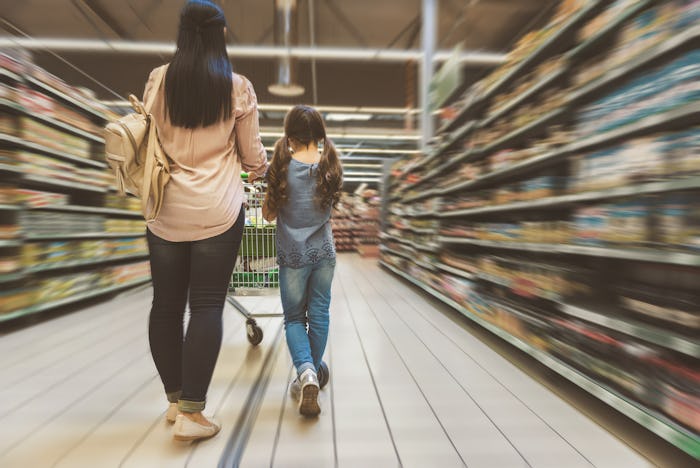Life

New Research Explores Why Parents Aren't Buying The Safest Food & Home Products
Shopping as a parent can be overwhelming, especially where it concerns food and product safety. Many families make an effort to purchase gentle products and high-quality foods, whether it be buying organic produce or opting for non-chemical cleaning supplies. But despite parents' good intentions, a new survey found that many families aren't buying the safest options out there. Although these findings might seem a bit confounding at first glance, the reasons for the disconnect are understandable.
A compelling study conducted by NSF International, an independent public health and safety organization, revealed on Tuesday, May 14 that 60 percent of the 1,000 Americans surveyed are "concerned about the products they put in, on and around their bodies," according to a press release. This statistic seems to track because many parents prioritize safety when it comes to their children, a sentiment brands like Jessica Alba's The Honest Company, to name one example, have marketed to.
But while many Americans are worried about product and food safety, 34 percent of participants said they "rarely or never research product claims," according to the press release.
Once again, this finding seems to fit, despite the initially confusing disconnect. Many busy parents, for instance, don't have the time to thoroughly research a product, even though it might be a priority. I can relate to this because I often buy products that are branded as healthy without doing my homework to make sure the claims checks out.
What's especially interesting about these findings? Many people will buy products even if they're distrusting of its claims. About 48 percent of the participants surveyed, for instance, would buy food without verifying the details, according to the study.
A good example I can think of is yogurt — many companies claim its yogurt products are healthy, but these same yogurts are often loaded with sugar.
Furthermore, Generation X is more likely than millennials and baby boomers to trust a company's claims.
So, why aren't consumers checking out these claims despite caring about this very issue?
One reason concerns the many types of food certifications, aka the labels (think fair trade, non-MSG, etc.) you see on food products. About 75 percent of the study's participants said "there are so many food certifications that they lose track of what they mean," the findings reveal.
In addition to confusing food labels, 81 percent of the participants assume their products adhere to "strict quality and safety standards," while 60 percent don't "check to see if personal care products are verified as adhering to strict quality and safety standards."
NSF International believes "independent third-party certification" can help consumers sort out these issues.
“Given the complexity of global supply chains and the fact that health and safety standards vary by country, it’s challenging for consumers to conduct their own research into everything they buy,” NSF International’s Lisa Yakas said in a press release. “Independent third-party certification is the easiest way for consumers to check the safety and authenticity of products and the validity of product label claims.”
Another option is to talk to a trusted health professional about any food and product safety concerns you may have. Many health and safety advocates out there are happy to help.
That being said, parents shouldn't have to work overtime to find out whether a food or product is safe. Hopefully, stakeholders will work together to create more trusted and accessible options for families.